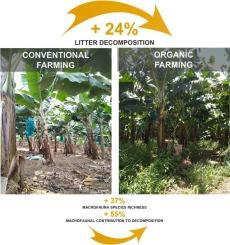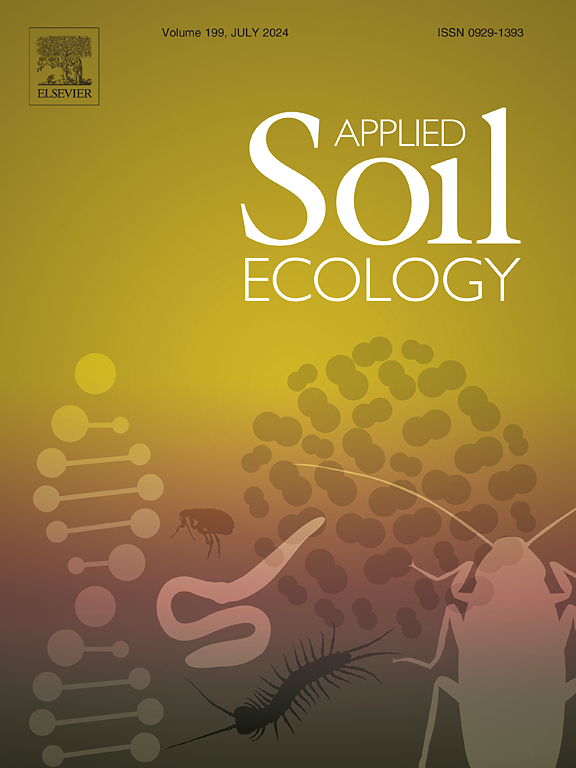Relationship between farming practices, soil macrofauna and litter decomposition in organic versus conventional banana agroecosystems
IF 4.8
2区 农林科学
Q1 SOIL SCIENCE
引用次数: 0
Abstract
Many agricultural practices used in conventional farming can have negative impacts on soil biodiversity and decomposition process. Conversion to organic farming could reduce the effect of these disturbances, but in situ consequences of these effects are still poorly investigated. In order to better support the ecological transition towards an organic agriculture in tropical agroecosystems, it is important to better understand the links between agricultural practices, soil macrofauna and the decomposition process. To reach this goal, we conducted a field experiment in banana agroecosystems in Martinique (Lesser Antilles). We selected six organic and six conventional banana fields located in two bioclimatic zones. In order to measure the microbial and macrofaunal contribution to decomposition, 264 litterbags, with either a small or large mesh size, were positioned and left in the field for three months. Glyphosate-contaminated and glyphosate-free banana leaf litters were tested. Biotic and abiotic field characteristics were measured. Our results confirmed the overall beneficial effect of converting to organic agriculture on the decomposition process (+24 %) for bananas leaf litter. Macrofaunal decomposition was increased more (55 %) than microbial decomposition (20 %), indicating that organic farming removes a constraint of conventional farming especially affecting macrofauna. Glyphosate contamination of the litter did not have a significant effect on overall litter decomposition. By using structural equations, we were able to link farming practices to macrofauna diversity and to decomposition process, through a cascading chain of effects. We found that organic farming enhanced macrofaunal contribution to decomposition by enhancing both macro-arthropod and earthworm richness by providing a diversity of microhabitats with dense and species-rich plant cover. Our results suggested a weak effect of the direct toxicity by glyphosate-contaminated litter ingestion, but an indirect effect of herbicides by destroying the soil weed cover providing resources and microhabitats for soil macrofauna. Soil weed cover thus appears to be an important element of the agroecosystem ensuring the sustainability of ecosystem processes.

有机与传统香蕉农业生态系统中耕作方法、土壤大型动物和废弃物分解之间的关系
传统耕作中使用的许多农业方法会对土壤生物多样性和分解过程产生负面影响。转为有机耕作可以减少这些干扰的影响,但对这些影响的现场后果的调查仍然很少。为了更好地支持热带农业生态系统向有机农业的生态转型,更好地了解农业实践、土壤大型动物和分解过程之间的联系非常重要。为了实现这一目标,我们在马提尼克岛(小安的列斯群岛)的香蕉农业生态系统中开展了一项田间试验。我们选择了位于两个生物气候区的六块有机香蕉田和六块传统香蕉田。为了测量微生物和大型底栖动物对分解的贡献,我们在田间放置了 264 个网眼大小不同的垃圾袋,并在田间放置了三个月。测试了受草甘膦污染和不含草甘膦的香蕉叶废弃物。对田间生物和非生物特征进行了测量。我们的结果证实,转为有机农业对香蕉落叶的分解过程总体上有好处(+24%)。大型底栖动物的分解率(55%)高于微生物分解率(20%),这表明有机耕作消除了传统耕作的制约因素,尤其是对大型底栖动物的影响。草甘膦对枯落物的污染对枯落物的整体分解没有显著影响。通过使用结构方程,我们能够将耕作方式与大型底栖动物多样性和分解过程联系起来,并形成一个级联效应链。我们发现,有机耕作能提高大型节肢动物和蚯蚓的丰富度,提供物种丰富、植被茂密的微生境多样性,从而增强大型动物对分解的贡献。我们的研究结果表明,草甘膦污染垃圾的直接毒性作用较弱,但除草剂通过破坏为土壤大型底栖动物提供资源和微生境的土壤杂草覆盖层而产生间接影响。因此,土壤杂草覆盖似乎是农业生态系统的一个重要元素,可确保生态系统过程的可持续性。
本文章由计算机程序翻译,如有差异,请以英文原文为准。
求助全文
约1分钟内获得全文
求助全文
来源期刊

Applied Soil Ecology
农林科学-土壤科学
CiteScore
9.70
自引率
4.20%
发文量
363
审稿时长
5.3 months
期刊介绍:
Applied Soil Ecology addresses the role of soil organisms and their interactions in relation to: sustainability and productivity, nutrient cycling and other soil processes, the maintenance of soil functions, the impact of human activities on soil ecosystems and bio(techno)logical control of soil-inhabiting pests, diseases and weeds.
 求助内容:
求助内容: 应助结果提醒方式:
应助结果提醒方式:


